Awards and rewards: Examples of how praise varies and journalism matters
Journalism awards praise the work journalists produce but they’re not the only measure of appreciation. Sometimes a kind gesture from a reader brings the best acknowledgment for a job well done.
Welcome back to Don’t Forget My Voice, a newsletter to help you navigate journalism’s chaotic and toxic maze. I’m Mc Nelly Torres, a longtime investigative journalist, editor, trainer and mentor.

I was in college when I won my first journalism award. I was a staff member at USC Today, the student-led newspaper at the University of Southern Colorado, now known as Colorado State University-Pueblo.
Richard Joyce, our journalism professor and adviser to the student newspaper, submitted the entries every year.
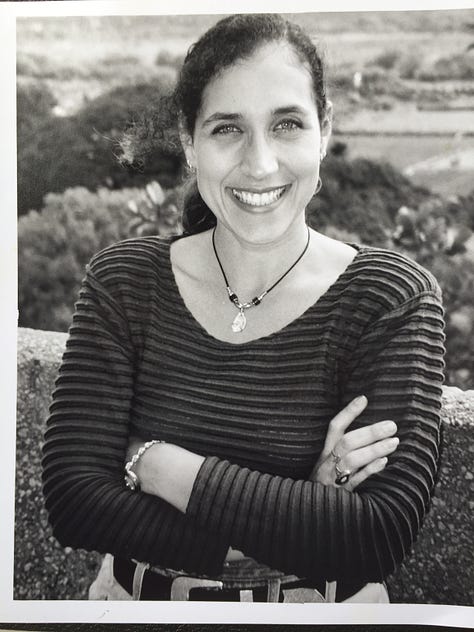
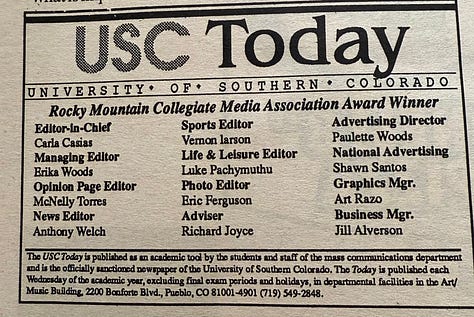
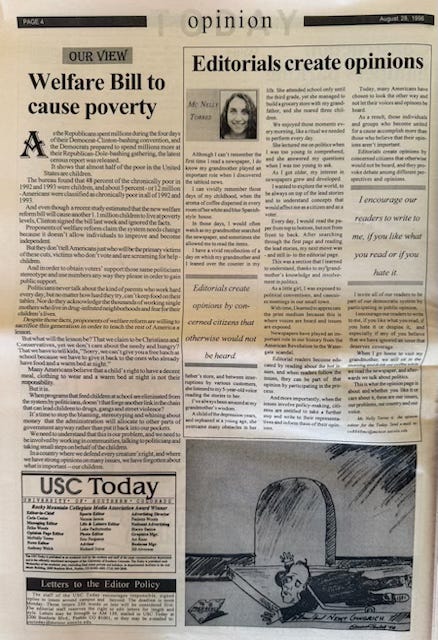
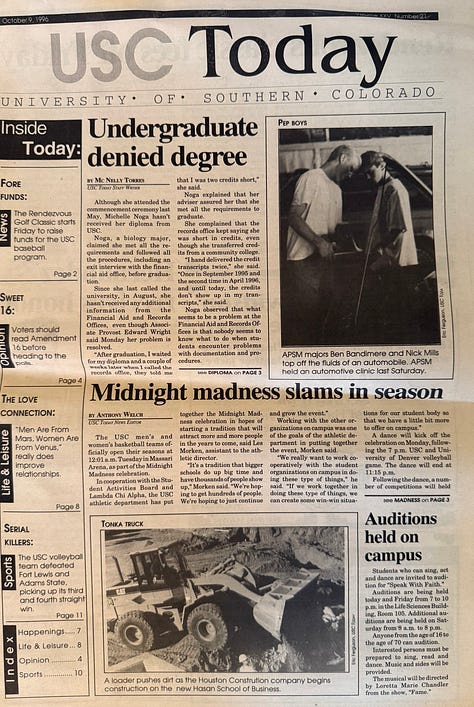
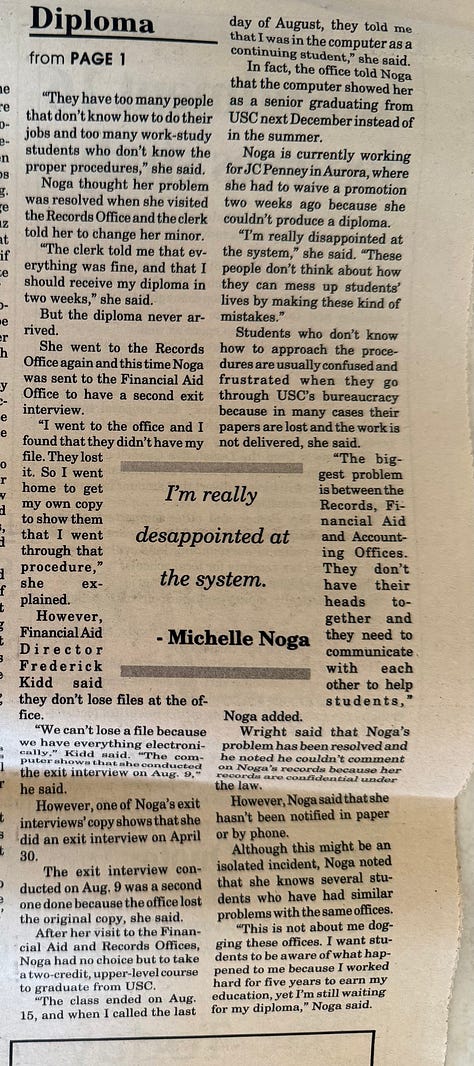
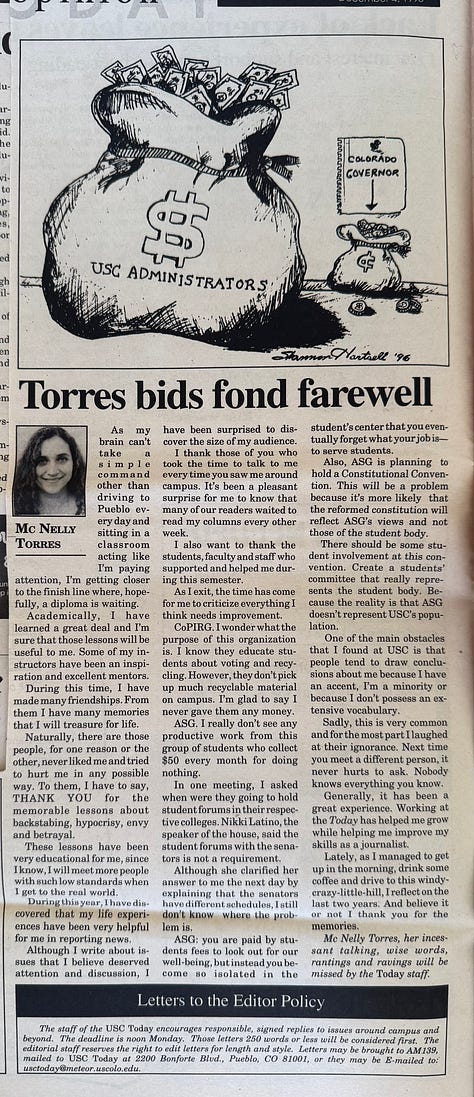
After I started my newspaper career, I quickly experienced the nasty politics of newsroom award committees. I didn’t have anybody to advocate for me and didn’t quite yet understand how much weight managers put on awards for promotions and hiring.
These days, three decades into my career, I have garnered more awards that I can fit in my résumé, or hang neatly on a wall. But I got them because I advocated for myself and the people I managed. I know now that if you don’t advocate and value yourself, nobody else will.
I’ve learned this the hard way. Favoritism, sadly, exists in many newsrooms and may limit people’s options at contest time. The selection process can seem unfair by design.
Years ago, when I was an investigative producer for a local TV station in Miami, I submitted my first entry for a regional Emmy. Many of my colleagues were doing the same after the bigwigs selected the entries the station supported and paid the fees. I prepared my own entry and paid my own way.
But the station did buy the tickets for the fancy Emmy award ceremony in 2015 in South Florida, so I went. I had a handful of nominations, including the story I submitted, which was extremely difficult to complete (More on that in the future). I went to the awards night to treat myself for all the work and experience something new even if I didn’t win anything.
I was flabbergasted when my name was called from the lectern, announcing that I won my first Emmy. I had no acceptance speech prepared, so I improvised.

Although I’d won, none of the entries the investigative unit’s executive producer selected had won.
The moral of the story: You can’t win if you don’t submit. And sometimes, you have to be the submitter.
Awards season is here
I’m writing about this topic because it's awards season. And, by happy coincidence, I learned a project I’d spent two years working with a team at my last employer, the Center for Public Integrity, in collaboration with Reveal and later Mother Jones, had earned multiple awards, and Pulitzer consideration.
If you haven’t read 40 Acres and Lie, I suggest you do and listen to the accompanying podcast. It’s a groundbreaking project worth your time.
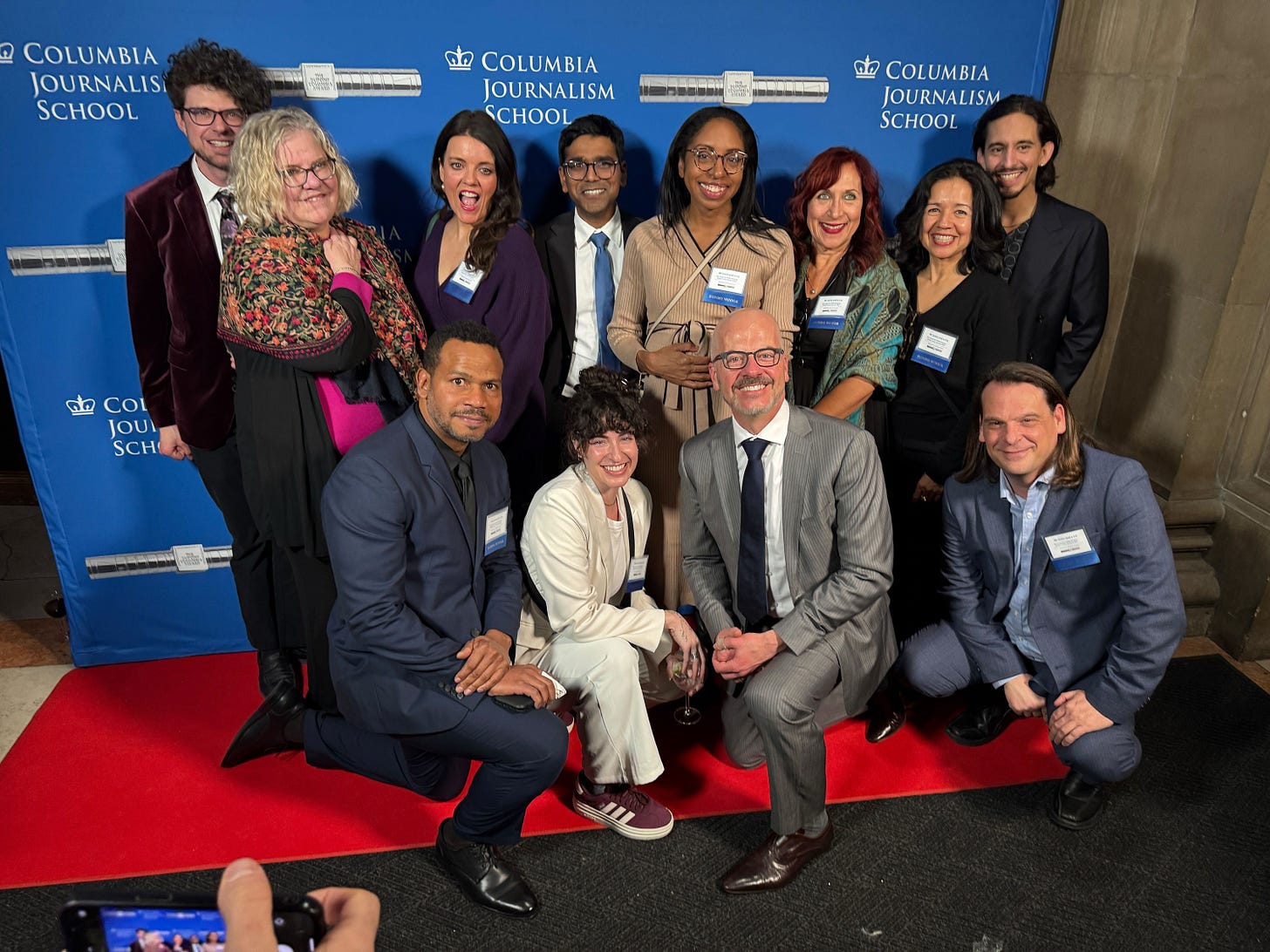
This project was completed under stressful and awful circumstances as we lost a former colleague to cancer, lost our newsroom leadership and were working to complete projects knowing we were all about to be laid off.
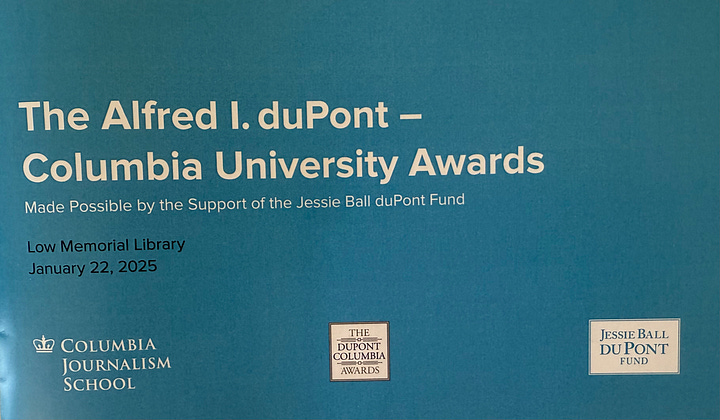
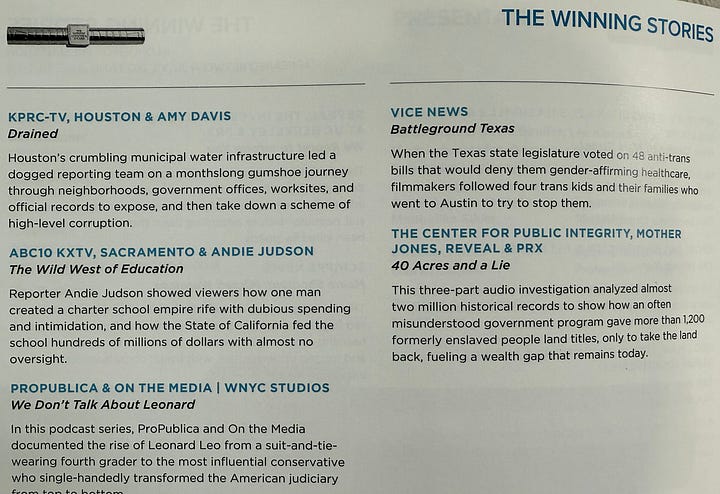
But life sometimes is bittersweet and works in mysterious ways. We won a Philip Meyer Journalism Award (second place) announced last fall, The Alfred I. duPont-Columbia University Awards early this year, and in recent weeks: Investigative Reporters and Editors award and a Pulitzer Prize finalist citation for narrative writing.
I’m proud of my former direct reports, senior reporters Alexia Fernández Campbell, who started the project, and April Simpson and everyone in the team.
I will never forget this experience for as long as I live.
Maya Angelou said, “We may encounter many defeats but we must not be defeated.”
Here’s how you can not be defeated, and overcome challenges in your newsroom:
Document your stories’ impact. Use social media to celebrate it.
Keep a list of journalism contests. Don’t forget to include the inexpensive ones. Sometimes, if you belong to an organization, you get a lower entry fee or one entry in a category for free.
Read the guidelines. Learn the qualifications, deadlines, categories, eligibility and limitations.
Be strategic. Some contests will let you enter the same story in more than one category.
Be a self-starter. Write a nominating letter to help your editor. You know the story you produced better than anyone. This will make it easier to get your entry into consideration.
Beyond entering for yourself, help with other contests. Volunteer to judge at your local college or any contest with a journalism member organization. These groups are always looking for people to help with contests in English and Spanish. It’s a lot of work, but rewarding. You’ll meet new people and make new connections, and you never know who might be able to help you, or whom you might be able to help.
Never forget to pay it forward. If you get the opportunity to bring in new people to judge contests, do it. Someone opened doors for you and you should do the same for others.
Kindness defeats evil
From the outside they seemed like a typical middle-class American family. Father, an electrician working at the Goodyear factory in Lawton; mother, a librarian at a local public school.
There was a veneer of wholesomeness. The blended family — mom had two girls and a boy from her first marriage and the couple conceived a girl — was active in church, both teaching Sunday Bible classes.
But something sinister was taking place. The woman in the marriage has lost a husband to suicide, and the man she married had been that former husband’s best friend. The new husband began sexually abusing the family’s eldest stepdaughter and continued for years, starting when she was 12. He also physically abused his stepson.
The eldest stepdaughter reported the crimes to police after she discovered that her stepfather, who had stopped abusing her, was now abusing her sister. The sister’s abuse also started when she was 12.
The testimony during hearings and the trial painted a sexual predator who abused and emotionally terrorized the siblings for years. It was one of the worst sex abuse cases I ever exposed as a crime reporter.
I spent months covering court hearings before the trial.
Then, one day, this case turned frighteningly personal.
I was at the Fort Sill commissary, grocery shopping with my 6-year old daughter, when I saw the defendant’s mother.
I became anxious; I quickly pushed my cart and hurried my daughter. I thought, I hoped, the woman hadn’t seen me.
But she had. She approached me from behind and tapped my shoulder.
“Ms. Torres,” she said. “I want to talk to you about my son’s innocence.”
I felt trapped and paralyzed because my daughter was present. I told the woman that I was neither an attorney nor a prosecutor. I was a reporter covering the trial.
That was my job.
I told her that I was not working at the moment and that she should call me at the office Monday to discuss anything further. I reiterated that I was just covering the hearings.
I was terrified. I went home and told my husband, “This place is getting too small. It’s time for us to leave.”
I never again shopped for groceries with my children in that community.
I don’t remember what my editor said when I shared this with him. In those days, your safety was solely your responsibility. But he said to transfer any calls from her to him.
After the jury found the abuser guilty and sentenced him to basically die in prison, I was ready for the whole episode to be over. I wanted to write the final story and move on.
But from this moment of anxiety emerged an indelible moment of grace.
As I walked into the courthouse’s small elevator, I realized that the three victims were there with me. It was awkward, but I said a soft hello.
Silence took over.
These three siblings had seen me in the courtroom all this time. But we’d never spoken.
The eldest sister, then a college student, came toward me and said: “I want to thank you for your work. You have reported this case with integrity.”
I didn’t know what to say. I had tears in my eyes.
Sometimes, journalism exposes us to the evil in this world; as we report and write about the most heinous, most horrendous acts humans can commit — including sexually abusing children.
But then an act of kindness arrives, like a shining light. That’s when you understand that rewards in this job come in different forms.
Journalism awards are great; they bring moments of public recognition and collective joy coupled with shiny souvenir trophies and plaques. But kind, private gestures, like the elevator moment and that young woman’s thank you, resonate just as powerfully.
They, too, remind us why journalism matters.
Follow Mc Nelly on Bluesky, Threads, LinkedIn, X, Substack Notes and be part of the community I’m building online. Drop me a note if you want to provide feedback, would like me to discuss a specific subject, collaborate or just to say hello at mcnellytorres@substack.com. Join our chat room here.
Never miss an update—every new post is sent directly to your email inbox. For a spam-free, ad-free reading experience, plus audio and community features, get the Substack app.
Tell me what you think
Be part of a community of people who share your interests. Participate in the comments section, or support this work with a subscription.







Recently I saw a movie, Shattered Glass, ostensibly about a reporter who faked his stories, but more deeply, about the power of favoritism to blind his newsroom to what he was doing. We don't talk about it, but newsrooms run on favoritism. Courage points to you for saying it out loud. Thanks, too, for bringing 40 Acres ... to our attention. Too many probably haven't heard of it, and it, too, is a courageous story that deserves attention. Then-President Johnson overturned Sherman's field order 19 less than a year after it was issued!